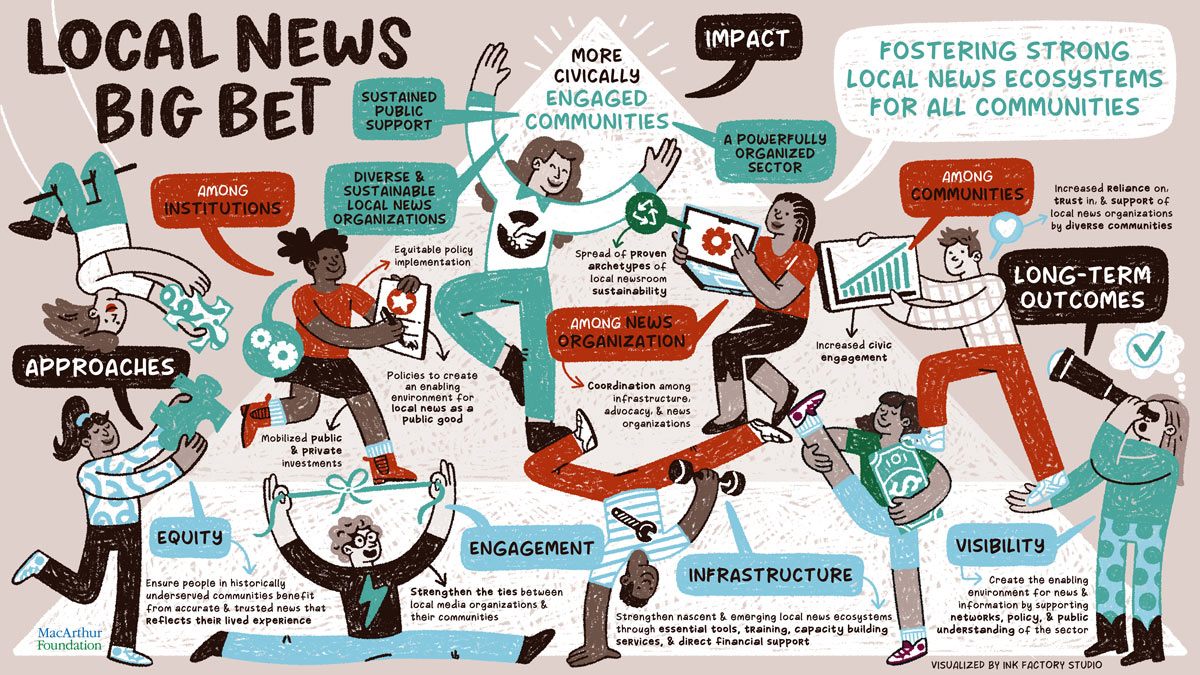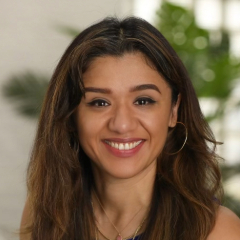Silvia Rivera, Director, Local News, shares how we are solidifying our Local News strategy and, through collaboration, aligning its grantmaking with Press Forward.
After spending my entire career working to promote the representation of diverse voices and leadership in community media in Chicago and across the country, and after having written countless proposals supporting these institutions, I serendipitously found myself as a newcomer to philanthropy. I now lead our grantmaking portfolio for the Local News Program. At this moment in our history, it feels especially significant to have a role in the movement to catalyze proven innovations and interventions that center local news as a force for community cohesion, civic participation, and government accountability.
The Local News Program was endorsed by our Board of Directors in June 2023 as part of MacArthur’s Big Bets and launched in conjunction with Press Forward, a donor collaborative of over 70 national, regional, local, and issue-based funders that has committed at least $500 million to support local news.
As part of our contribution to and leadership in this effort, MacArthur committed $150 million in new money to local news over five years, with the potential for up to $25 million in additional impact investments. Since our launch, we have invested $90 million and will likely pass our original grantmaking target by 2028.
Since our launch, we have invested $90 million and will likely pass our original grantmaking target by 2028.
We made these grants to align ourselves with the values of Press Forward's pillars and model what aligned and collaborative grantmaking looks like. Importantly, we made grants that incentivize and/or facilitate the creation of local chapters, like Press Forward Chicago.
During this process, we took some time to pause—not to stop progress but to develop a strategic framework for Local News that is distinct from, yet complementary to, the aligned efforts of funders like the Knight Foundation and Press Forward's Pooled Fund grantmaking strategy. Our goal was to understand how we could make the greatest impact during the remainder of our Big Bet.
Refining Our Strategic Approach
We began by kicking off our strategic planning process last July, reviewing existing research in our space, conducting our own landscape research, incorporating our grantees' perspectives, and engaging in conversations with local news leaders from across the country. And of course, I tapped into my own lived experience, working to strengthen local news ecosystems and with first-hand understanding of the challenges that small and large newsrooms face as they navigate shifting media, technological, and funding landscapes.

An illustration depicts the Local News Program's strategic approach. View accessible PDF ›
With our updated strategy the Local News Program seeks to create local ecosystems with replicable components that create virtuous cycles of sustainability, trust, and civic engagement—also known as “thriving local news archetypes.” To achieve this goal, we will lean into the following four approaches:
- Equity: Ensure people in historically underserved communities benefit from accurate and trusted news that reflects their lived experience.
- Engagement: Strengthen the ties between local media organizations and their communities.
- Infrastructure: Strengthen nascent and emerging local news ecosystems, particularly in historically underserved communities, by providing support for essential tools, training, capacity, and services, as well as direct financial support.
- Visibility: Raise awareness among local, state, and national decision makers about the critical role of local news and advocate for initiatives that establish and sustain local news as a public good.
We believe we are uniquely positioned to support initiatives that actively uplift underrepresented voices and direct resources where they are most needed and can have the greatest impact. Equity will be a key consideration in our place-based support for historically marginalized communities, particularly in specific regions such as the American South, rural areas, and Chicago. Our Foundation-wide commitment to racial justice and equity will serve as a guiding principle and a consistent theme across all our approaches.
Addressing Challenges Ahead
We are clear-eyed about the road ahead not being an easy one. In fact, the environment we are operating in is becoming more challenging. A recent study by the Pew Research Center indicates that young adults increasingly obtain news from social media influencers, which affects their perception of current events and civic engagement. Meanwhile, Latine and Spanish-speaking communities are the targets of mis- and disinformation campaigns on social media. And there are threats to strip away protections for journalists’ sources.
At the same time, proposed spending cuts to the Corporation for Public Broadcasting could negatively impact rural communities reliant on local public radio. Concerns are also rising around H.R. 9495, which could allow the Treasury Secretary to revoke the tax-exempt status of nonprofits, and this could include newsrooms.
Late last year, the Medill Local News Initiative released its State of Local News Report 2024, highlighting the expansion of local news deserts in the U.S. It reported that 127 newspapers closed, leaving nearly 55 million Americans with limited or no access to local news.
Yet we know that there are models across the country that treat local news and information as a public good, created by, for, and together with diverse communities across the United States. Recent Press Forward and MacArthur grantees are contributing to these models.
As Zach Metzger, director of the Medill State of Local News Project, stated, “The gulf between journalism haves and have-nots is continuing to grow. Yet there remains a strong desire for original local reporting. The need now is to match that desire with support, investment, and policy.”
We share this belief and are betting on meeting this moment.




